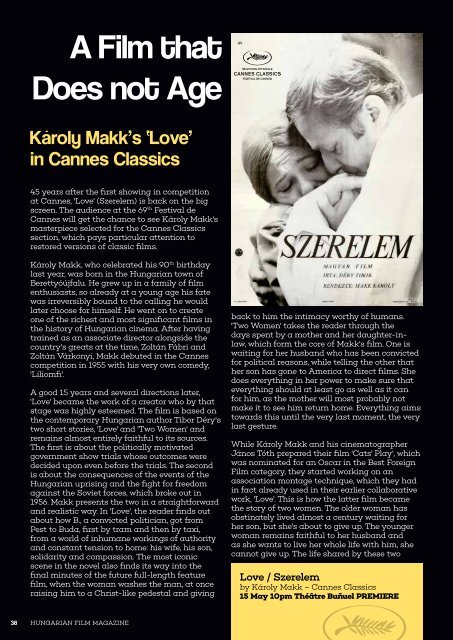Create successful ePaper yourself
Turn your PDF publications into a flip-book with our unique Google optimized e-Paper software.
A <strong>Film</strong> that<br />
Does not Age<br />
Károly Makk’s ‘Love’<br />
in <strong>Cannes</strong> Classics<br />
45 years after the first showing in competition<br />
at <strong>Cannes</strong>, 'Love' (Szerelem) is back on the big<br />
screen. <strong>The</strong> audience at the 69 th Festival de<br />
<strong>Cannes</strong> will get the chance to see Károly Makk's<br />
masterpiece selected for the <strong>Cannes</strong> Classics<br />
section, which pays particular attention to<br />
restored versions of classic films.<br />
Károly Makk, who celebrated his 90 th birthday<br />
last year, was born in the <strong>Hungarian</strong> town of<br />
Berettyóújfalu. He grew up in a family of film<br />
enthusiasts, so already at a young age his fate<br />
was irreversibly bound to the calling he would<br />
later choose for himself. He went on to create<br />
one of the richest and most significant films in<br />
the history of <strong>Hungarian</strong> cinema. After having<br />
trained as an associate director alongside the<br />
country's greats at the time, Zoltán Fábri and<br />
Zoltán Várkonyi, Makk debuted in the <strong>Cannes</strong><br />
competition in 1955 with his very own comedy,<br />
'Liliomfi'.<br />
A good 15 years and several directions later,<br />
'Love' became the work of a creator who by that<br />
stage was highly esteemed. <strong>The</strong> film is based on<br />
the contemporary <strong>Hungarian</strong> author Tibor Déry's<br />
two short stories, 'Love' and 'Two Women' and<br />
remains almost entirely faithful to its sources.<br />
<strong>The</strong> first is about the politically motivated<br />
government show trials whose outcomes were<br />
decided upon even before the trials. <strong>The</strong> second<br />
is about the consequences of the events of the<br />
<strong>Hungarian</strong> uprising and the fight for freedom<br />
against the Soviet forces, which broke out in<br />
1956. Makk presents the two in a straightforward<br />
and realistic way. In 'Love', the reader finds out<br />
about how B., a convicted politician, got from<br />
Pest to Buda, first by tram and then by taxi,<br />
from a world of inhumane workings of authority<br />
and constant tension to home: his wife, his son,<br />
solidarity and compassion. <strong>The</strong> most iconic<br />
scene in the novel also finds its way into the<br />
final minutes of the future full-length feature<br />
film, when the woman washes the man, at once<br />
raising him to a Christ-like pedestal and giving<br />
back to him the intimacy worthy of humans.<br />
'Two Women' takes the reader through the<br />
days spent by a mother and her daughter-inlaw,<br />
which form the core of Makk's film. One is<br />
waiting for her husband who has been convicted<br />
for political reasons, while telling the other that<br />
her son has gone to America to direct films. She<br />
does everything in her power to make sure that<br />
everything should at least go as well as it can<br />
for him, as the mother will most probably not<br />
make it to see him return home. Everything aims<br />
towards this until the very last moment, the very<br />
last gesture.<br />
While Károly Makk and his cinematographer<br />
János Tóth prepared their film 'Cats' Play', which<br />
was nominated for an Oscar in the Best Foreign<br />
<strong>Film</strong> category, they started working on an<br />
association montage technique, which they had<br />
in fact already used in their earlier collaborative<br />
work, 'Love'. This is how the latter film became<br />
the story of two women. <strong>The</strong> older woman has<br />
obstinately lived almost a century waiting for<br />
her son, but she's about to give up. <strong>The</strong> younger<br />
woman remains faithful to her husband and<br />
as she wants to live her whole life with him, she<br />
cannot give up. <strong>The</strong> life shared by these two<br />
Love / Szerelem<br />
by Károly Makk <strong>–</strong> <strong>Cannes</strong> Classics<br />
15 May 10pm Théâtre Buñuel PREMIERE<br />
38<br />
HUNGARIAN FILM MAGAZINE


